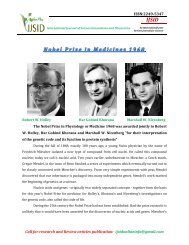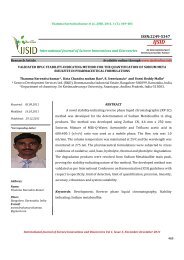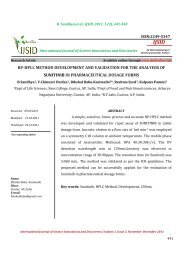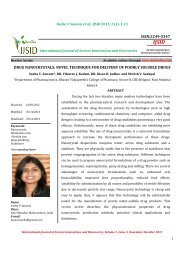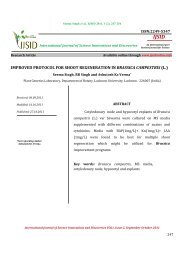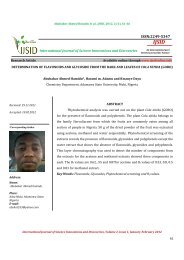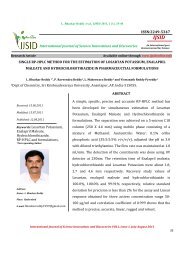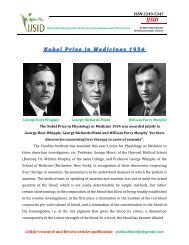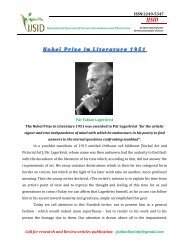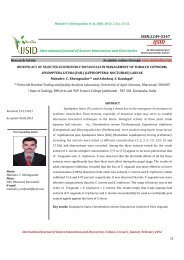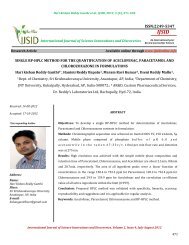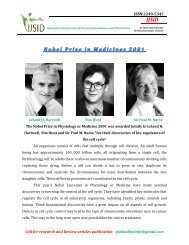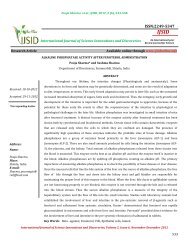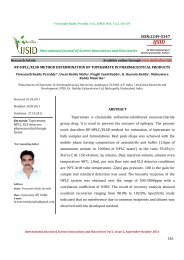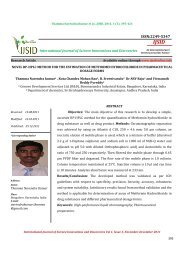The Nobel Prize in Literature 1956 was awarded to ... - Ijsidonline.info
The Nobel Prize in Literature 1956 was awarded to ... - Ijsidonline.info
The Nobel Prize in Literature 1956 was awarded to ... - Ijsidonline.info
Create successful ePaper yourself
Turn your PDF publications into a flip-book with our unique Google optimized e-Paper software.
ISSN:2249-5347<br />
IJSID<br />
International Journal of Science Innovations and Discoveries<br />
An International peer<br />
Review Journal for Science<br />
Juan Ramón Jiménez<br />
<strong>The</strong> <strong>Nobel</strong> <strong>Prize</strong> <strong>in</strong> <strong>Literature</strong> <strong>1956</strong> <strong>was</strong> <strong>awarded</strong> <strong>to</strong> Juan Ramón Jiménez "for his<br />
lyrical poetry, which <strong>in</strong> Spanish language constitutes an example of high spirit and<br />
artistical purity".<br />
A long life consecrated <strong>to</strong> poetry and <strong>to</strong> beauty has been honoured this year with the <strong>Nobel</strong><br />
<strong>Prize</strong> <strong>in</strong> <strong>Literature</strong>. He is an old gardener, this Juan Ramón, who has dedicated half a<br />
century <strong>to</strong> the creation of a new rose, a white mystical rose, which will bear his name.<br />
Jard<strong>in</strong>es lejanos (Distant Gardens), 1904, is one of his books from the beg<strong>in</strong>n<strong>in</strong>g of<br />
the century. In the southern parts of Andalusia, far off the route from Jerez <strong>to</strong> Seville well<br />
known <strong>to</strong> Swedish <strong>to</strong>urists, the poet <strong>was</strong> born <strong>in</strong> 1881. But his poetry is not a strong and<br />
<strong>in</strong><strong>to</strong>xicat<strong>in</strong>g w<strong>in</strong>e, and his work not a grandiose mosque turned <strong>in</strong><strong>to</strong> a cathedral. It makes<br />
you th<strong>in</strong>k, rather, of one of those gardens circled by high, white<strong>was</strong>hed walls which you see<br />
mark<strong>in</strong>g a landscape. He who s<strong>to</strong>ps a moment and goes <strong>in</strong> with his camera runs the risk of<br />
be<strong>in</strong>g deceived. <strong>The</strong>re is noth<strong>in</strong>g s<strong>in</strong>gular or picturesque here, only the usual th<strong>in</strong>gs: fruit<br />
trees and the air which vibrates on pass<strong>in</strong>g through them, the pond that reflects the sun<br />
and the moon, a bird s<strong>in</strong>g<strong>in</strong>g. No small m<strong>in</strong>aret has been transformed <strong>in</strong><strong>to</strong> an ivory <strong>to</strong>wer <strong>in</strong><br />
Call for research and Review articles publication: ijsidonl<strong>in</strong>e<strong>in</strong>fo@gmail.com
ISSN:2249-5347<br />
IJSID<br />
International Journal of Science Innovations and Discoveries<br />
An International peer<br />
Review Journal for Science<br />
this fertile garden planted <strong>in</strong> the soil of Arab culture. But the visi<strong>to</strong>r who l<strong>in</strong>gers will notice<br />
that the passivity with<strong>in</strong> the walls is deceiv<strong>in</strong>g, that the isolation is only of the<br />
circumstantial and transi<strong>to</strong>ry, of what pretends <strong>to</strong> be present. He will not fail <strong>to</strong> observe<br />
that the rose has a radiance which demands sharper senses and a new sensibility. <strong>The</strong>re is<br />
a beauty which is more than the play and delight of the senses; <strong>in</strong> front of the visi<strong>to</strong>r the<br />
silent gardener suddenly appears like a strict direc<strong>to</strong>r of souls. At the entrance of the<br />
Juanramonian garden the <strong>to</strong>urist ought <strong>to</strong> observe the same rules as on enter<strong>in</strong>g a mosque:<br />
<strong>was</strong>h his hands and r<strong>in</strong>se his mouth <strong>in</strong> the founta<strong>in</strong> for ablutions, take off his shoes, etc.<br />
<strong>The</strong> year <strong>in</strong> which Ramón Jiménez began <strong>to</strong> publish his melodious verses <strong>was</strong>, <strong>in</strong> the<br />
his<strong>to</strong>ry of Spa<strong>in</strong>, a year for an exam<strong>in</strong>ation of conscience. On December 10, 1898, <strong>in</strong> Paris,<br />
<strong>was</strong> signed the treaty with the United States by which Spa<strong>in</strong> lost Cuba, Puer<strong>to</strong> Rico, and the<br />
Philipp<strong>in</strong>es, as well as what rema<strong>in</strong>ed of its navy and its prestige. By a stroke of the pen the<br />
remnants of a whole colonial empire were elim<strong>in</strong>ated. In Madrid a group of writers <strong>to</strong>ok up<br />
the pen <strong>to</strong> reconquer, <strong>in</strong> their fashion, the world with<strong>in</strong> the boundaries of Spa<strong>in</strong>. Some of<br />
them ultimately atta<strong>in</strong>ed their goals. <strong>The</strong> Machado brothers, Valle-Inclán, and Unamuno<br />
were among them. <strong>The</strong> "modernists", as they called themselves, had <strong>in</strong> turn grouped<br />
themselves around their leader, the Nicaraguan Rubén Darío, visit<strong>in</strong>g <strong>in</strong> Spa<strong>in</strong>. It <strong>was</strong> Darío<br />
also who, at the beg<strong>in</strong>n<strong>in</strong>g of the century, sponsored the first book of verses of the new<br />
poet, Juan Ramón Jiménez, a book which bore the scarcely martial title, Almas de violeta<br />
(Souls of Violet), 1900.<br />
He <strong>was</strong> not an audacious crea<strong>to</strong>r who would present himself on stage <strong>in</strong> full light.<br />
His song arrived, timid and <strong>in</strong>timate, from a penumbral background, and spoke of the moon<br />
and of melancholy with echoes of Schumann and Chop<strong>in</strong>. He wept with He<strong>in</strong>e and with his<br />
countryman, <strong>in</strong>spired by He<strong>in</strong>e, Gustavo Adolfo Bécquer, the exquisite poet <strong>to</strong> whom some<br />
short-sighted admirers gave the name, "golden-haired Nordic K<strong>in</strong>g". In the manner of<br />
Verla<strong>in</strong>e he murmured his Arias tristes (Sad Arias), 1903, <strong>in</strong> a half-voice. When, little by<br />
little but with sure step, he had freed himself from the gentle, captivat<strong>in</strong>g arms of French<br />
Call for research and Review articles publication: ijsidonl<strong>in</strong>e<strong>in</strong>fo@gmail.com
ISSN:2249-5347<br />
IJSID<br />
International Journal of Science Innovations and Discoveries<br />
An International peer<br />
Review Journal for Science<br />
symbolism, the characteristic features of music and <strong>in</strong>timacy would rema<strong>in</strong> forever<br />
impressed on him.<br />
Music and pa<strong>in</strong>t<strong>in</strong>g - we can note that, <strong>in</strong> Seville, the young student also studied <strong>to</strong><br />
be a pa<strong>in</strong>ter. Just as we speak of the blue and rose periods of Picasso, who <strong>was</strong> born <strong>in</strong> the<br />
same year, as the his<strong>to</strong>rians of literature have called attention <strong>to</strong> the predom<strong>in</strong>ance of<br />
different colours <strong>in</strong> the work of Ramón Jiménez. To the first period belong all the poems <strong>in</strong><br />
yellow and green - the famous green poem of his disciple Garcia Lorca has its orig<strong>in</strong> here.<br />
Later, white predom<strong>in</strong>ates, and the nakedness of white characterizes the brilliant, decisive<br />
epoch which <strong>in</strong>cludes what has been called the second poetic style of Juan Ramón. Here we<br />
witness the long period of plenitude of a poet of light. Far off are the melancholy moodpictures,<br />
far off also the anecdotal themes. <strong>The</strong> poems treat only of poetry and love, and of<br />
the landscape and the sea which are identified with poetry and love. A formal asceticism<br />
carried <strong>to</strong> perfection, reject<strong>in</strong>g every exterior embellishment of the verse, will be the road<br />
that will lead <strong>to</strong> the simplicity that is the supreme form of art, the poetry that the poet calls<br />
naked.<br />
This "second style of Juan Ramón" reaches its full development <strong>in</strong> Diario de un poeta<br />
recién casado (Diary of a Newly-Wed Poet) <strong>in</strong> 1917. In this year the newly-wed poet made<br />
his first trip <strong>to</strong> America and his diary is full of an <strong>in</strong>f<strong>in</strong>ite feel<strong>in</strong>g for the sea, full of oceanic<br />
poetry. His books Eternidades (Eternities), 1918, and Piedra y cielo (S<strong>to</strong>ne and Sky), 1919<br />
mark new stages <strong>to</strong>ward the longed-for identification of the "I" with the world; poetry and<br />
thought have the purpose of f<strong>in</strong>d<strong>in</strong>g "the exact name for th<strong>in</strong>gs". Gradually the poems<br />
become more concise, naked, transparent; they are, <strong>in</strong> fact, maxims and aphorisms of the<br />
mystical poetics of Juan Ramón.<br />
In his constant zeal <strong>to</strong> surpass previous achievements, Ramón Jiménez has made a<br />
clean slate of his earliest production and has radically modified old poems, gather<strong>in</strong>g those<br />
merit<strong>in</strong>g his approval <strong>in</strong><strong>to</strong> extensive anthologies. After his volumes Belleza (Beauty) and<br />
Poesía (Poetry) <strong>in</strong> 1923, <strong>in</strong> his zeal <strong>to</strong> experiment with new forms, he abandoned the<br />
publication of his works <strong>in</strong> book form and often published without title or author's name, <strong>in</strong><br />
Call for research and Review articles publication: ijsidonl<strong>in</strong>e<strong>in</strong>fo@gmail.com
ISSN:2249-5347<br />
IJSID<br />
International Journal of Science Innovations and Discoveries<br />
An International peer<br />
Review Journal for Science<br />
the form of sheets or leaflets scattered by the w<strong>in</strong>d. In 1936 the civil war <strong>in</strong>terrupted the<br />
projected edition of his works <strong>in</strong> twenty-one volumes. Animal de fondo (Animal of Depth),<br />
1949, the last book from his period of exile, is, if read by itself, a sample of a work <strong>in</strong><br />
progress. Today, therefore, it is still premature <strong>to</strong> discuss this phase which, <strong>in</strong> literary<br />
his<strong>to</strong>ry, will perhaps carry the title "the last style of Juan Ramón".<br />
Far away, <strong>in</strong> what <strong>was</strong> the colony of Puer<strong>to</strong> Rico, he is afflicted <strong>to</strong>day by an immense<br />
sorrow. It will not be possible for us <strong>to</strong> see his th<strong>in</strong> face with its profound eyes and <strong>to</strong> ask<br />
ourselves if it has been taken directly from a pa<strong>in</strong>t<strong>in</strong>g by El Greco. We f<strong>in</strong>d a less solemn<br />
self-portrait <strong>in</strong> the delightful book, Platero y yo (Platero and I), 1914. <strong>The</strong>re, dressed <strong>in</strong><br />
mourn<strong>in</strong>g, the poet passes with his Nazarene beard, rid<strong>in</strong>g his little donkey while the gypsy<br />
children shout at the <strong>to</strong>p of their voices: <strong>The</strong> madman! <strong>The</strong> madman! <strong>The</strong> madman! ... And<br />
<strong>in</strong> truth it is not always easy <strong>to</strong> dist<strong>in</strong>guish a madman from a poet. But for like spirits the<br />
madness of this man has been em<strong>in</strong>ent wisdom. Rafael Alberti, Jorge Guillén, Pedro Sal<strong>in</strong>as,<br />
and others who have written their names <strong>in</strong> the recent his<strong>to</strong>ry of Spanish poetry have been<br />
his disciples; Federico Garcia Lorca is one of them, and so are the Lat<strong>in</strong> American poets,<br />
with Gabriela Mistral at their head. I cite the statement of a Swedish journalist on be<strong>in</strong>g<br />
<strong>in</strong>formed of the <strong>Nobel</strong> <strong>Prize</strong> <strong>in</strong> <strong>Literature</strong> for this year: "Juan Ramón Jiménez is a born poet,<br />
one of those who are born one day with the same simplicity with which the sun's rays<br />
sh<strong>in</strong>e, one who purely and simply has been born and has given of himself, unconscious of<br />
his natural talents. We do not know when such a poet is born. We know only that one day<br />
we f<strong>in</strong>d him, we see him, we hear him, just as one day we see a plant flower. We call this a<br />
miracle".<br />
In the annals of the <strong>Nobel</strong> <strong>Prize</strong>, Spanish literature has been one of the distant<br />
gardens. Very rarely have we cast a glance <strong>in</strong>side. This year's laureate is the last survivor of<br />
the famous "generation of 1898". For a generation of poets on both sides of the ocean<br />
which separates, and at the same time, unites the Hispanic countries, he has been a master<br />
- the master, <strong>in</strong> effect. When the Swedish Academy renders homage <strong>to</strong> Juan Ramón Jiménez,<br />
it renders homage also <strong>to</strong> an entire epoch <strong>in</strong> the glorious Spanish literature.<br />
Call for research and Review articles publication: ijsidonl<strong>in</strong>e<strong>in</strong>fo@gmail.com
ISSN:2249-5347<br />
IJSID<br />
International Journal of Science Innovations and Discoveries<br />
An International peer<br />
Review Journal for Science<br />
For more details please visit:<br />
http://www.nobelprize.org/nobel_prizes/literature/laureates/<strong>1956</strong>/press.html<br />
Call for research and Review articles publication: ijsidonl<strong>in</strong>e<strong>in</strong>fo@gmail.com



